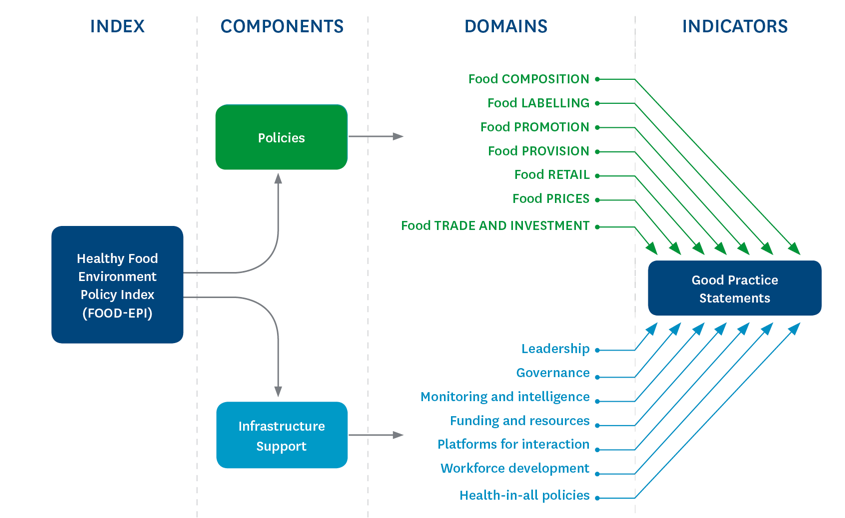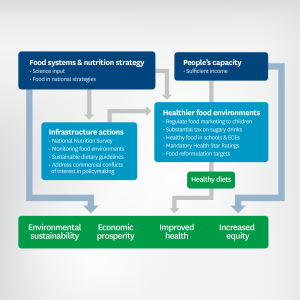Public Sector Policies and Actions (Food-EPI)
Select country tabs for individual Food-EPI reports
Effective government policies are essential to increase the healthiness of food environments and to reduce obesity, NCDs, and their related inequalities. Food environments are defined as the collective physical, economic, policy and socio-cultural surroundings, opportunities and conditions that influence people’s food and beverage choices and nutritional status. Unhealthy food environments lead to unhealthy diets and excess energy intake which have consequences in levels of morbidity and mortality. It is critical that Governments implement preventive policies and actions to match the magnitude of the burden that unhealthy diets are creating. Monitoring the level of implementation of the policies and actions recommended by the World Health Organization (WHO) is an important part of ensuring progress towards better nutritional health.
The Food-EPI index consists of two components (Policies and Infrastructure Support), 13 domains and 47 good practice indicators. A national expert panel aims to rate the level of implementation of policies on food environments by the Government against international best practice, and then, based on the implementation gaps, propose and prioritize key actions for implementation by the government.
The Healthy Food Environment Policy Index (Food-EPI)

Go to the New Zealand tab for the Food-EPI 2020 reports.
The Healthy Food Environment Policy Index (Food-EPI) was developed in 2013 to measure the extent of implementation of healthy food environment policies by governments compared to international best practice. The tool and process were first pilot tested and implemented in New Zealand in 2014 and then again in 2017. Since 2014, 15 countries have implemented Food-EPI and 10 other countries are in the preparation phase. Several countries have also implemented innovations to the original protocol, process and methodology.
A first multi-country study including results from 11 countries has been completed and published in Obesity Reviews. There is also scope for conducting regional comparisions.
Innovations by countries
- Self-assessment by state actors in several countries (Thailand, Mexico, New
Zealand, Malaysia) - Consensus workshop/meeting on prioritized actions with state and non-state
actors (Thailand) - Taking into account the double burden of malnutrition in the prioritization of
actions (Senegal) - Using Food-EPI results as a situation analysis for the preparation of Food-Based
Dietary Guidelines (Senegal) - Regional capacity building (Latin American countries, West African countries,
Europe) - Applying the Food-EPI at the state/federal levels (Canada, Australia)
- Applying the Food-EPI at the local/city levels (Canada)
Future plans/developments
- There are plans for further expansion in Africa (Burkina Faso, Benin, Togo, Côte
d’Ivoire, Tanzania, and Uganda). - More robust process for updating the benchmarks or best practice exemplars
- Application of Food-EPI at the supranational level (Europe) and adaptation to monitor policies at the municipal level
- Stimulation of countries which have finished to repeat the Food-EPI in the future
- Measuring impact of the Food-EPI on policy
- Developing the index further in order to stimulate double- and triple- duty actions
such as recommended by the Global Syndemic report
 Stefanie Vandevijvere (Coordinator)
Stefanie Vandevijvere (Coordinator)
Senior Scientist Nutrition and Health, Scientific Institute of Public Health (Sciensano), Brussels, Belgium
Honorary Senior Research fellow, School of Population Health, The University of Auckland
Email: Stefanie Vandevijvere
 Boyd Swinburn
Boyd Swinburn
Professor of Population Nutrition and Global Health,
The University of Auckland, New Zealand
Email: Boyd Swinburn
 Amos Laar
Amos Laar
Bioethicist & Professor of Public Health
The University of Ghana, Ghana
Email: Amos Laar
 Janas Harrington
Janas Harrington
Senior Lecturer in Public Health Nutrition
University College Dublin, Ireland
Email: Janas Harrington
 Fernanda Kroker
Fernanda Kroker
Research Fellow in Population Nutrition
Institute of Nutrition of Central America and Panama (INCAP), Guatemala
Email: Fernanda Kroker-Lobos
 Lana Vanderlee
Lana Vanderlee
Assistant Professor
Université de Laval, Canada
Email: Dr. Lana Vanderlee
Monitoring and benchmarking government policies and actions to improve the healthiness of food environments: a proposed Government Healthy Food Environment Policy Index (pages 24–37) B. Swinburn, S. Vandevijvere, V. Kraak, G. Sacks, W. Snowdon, C. Hawkes, S. Barquera, S. Friel, B. Kelly, S. Kumanyika, M. L’Abbé, A. Lee, T. Lobstein, J. Ma, J. Macmullan, S. Mohan, C. Monteiro, B. Neal, M. Rayner, D. Sanders, C. Walker and INFORMAS Read the INFORMAS paper online here Additional Publications
Below is the INFORMAS protocol to download. Please contact us if you would like more information. Please read the terms and conditions (also embedded in the protocol) regarding the use of the protocols. You must complete and return this agreement to us if you are using and/or adapting the protocol. You may use, modify and reproduce the protocol, but the work that results from using the INFORMAS resources remains available to the INFORMAS group and falls under the same ‘copyleft’ principles as the original protocol (i.e., you can’t claim copyright on protocols you develop based on INFORMAS resources). You don’t have to share the whole work that results from using the INFORMAS resources, but are expected to share:
- Any modifications or updates you make to the protocol (e.g., updates for your own country)
- The final (cleaned) data as collected using the protocol.
- Health Research Council of New Zealand
- New Zealand Heart Foundation
- International Development Research Centre
- Food and Nutrition Policy for Health Promotion Program, International Health Policy Program at Ministry of Public Health Thailand
- Australian Partnership Prevention Centre
- Thai Health Promotion Foundation
- Saw Swee Hock School of Public Health Singapore
- Canadian Institutes of Health Research
- Bill and Melinda Gates Foundation
- Joint Programming Initiatives, Europe
- Horizon2020, Europe
- Australian Partnership Prevention Centre
- Esmee Fairbairn Foundation
- Nuffield Foundation
- Australia
- China
- New Zealand
- Fiji
- Thailand
- Malaysia
- Vietnam
- Singapore
- Mexico
- Japan
- Chile
- Guatemala
- South Africa
- Brazil
- Kenya
- Ghana
- Tanzania
- Senegal
- Burkina Faso
- Uganda
- Benin
- Togo
- Cote d'Ivoire
- England (UK)
- PEN (Policy Evaluation Network) Ireland, Netherlands, Poland, Germany, Norway
- STOP (Science & Technology Childhood Obesity Policy) Finland, Estonia, Italy, Slovenia, Portugal, Spain
- Belgium
- Iceland
- Canada
- The Netherlands
- European Union
- Germany
- Ireland
- Norway
- Tab
In Australia, the Food-EPI was applied at the federal, as well as the state level. The project team worked closely with government officials to document current policy actions (up to 30 June 2016) in each jurisdiction, across 42 policy areas of the Food-EPI tool. Over 100 experts (including academics, nutritionists, and senior representatives from health NGOs and community groups) from 53 organisations assessed the extent of implementation in each policy area, for each level of government. They also identified policy recommendations for each jurisdiction, and prioritised them based on their perceived importance and achievability. Food-EPI Executive Summary Report Australia
The 2019 Food Policy Index Update report provides a follow up to the 2017 Food Policy Index report. It summarises and assesses the actions taken by Australian governments (July 2016 – December 2018) in relation to the recommended policies identified in the 2017 report. Food-EPI Update 2019
Applied Food-EPI indicators to evaluate China’s food marketing policies in comparison with international best practices. The evaluation encompassed context analysis, data collection, evidence-based policy action, government validation, policy rating, scoring, and results translation for government and stakeholders. The three chosen indicators specifically addressed childhood overweight- and obesity-related food marketing in broadcast media (Indicator 1), non-broadcast media (Indicator 2), and child-gathering settings (Indicator 3). See the related original research article here.
Food-EPI New Zealand 2023
Food-EPI (Healthy Food Environment Policy Index) was recently conducted for the fourth time in Aotearoa New Zealand to benchmark government policies influencing food environments against international best practice. Some policies were comparable with international best practice, but New Zealand falls short in many areas including for healthy food and drinks in all schools, fiscal policies influencing food costs, and restricting marketing of unhealthy foods that children see.
Sixty experts prioritised the need for a comprehensive multi-sector food systems strategy and for people to have sufficient income to make healthy food choices with autonomy. Five policy actions and five infrastructure support actions were prioritised for immediate action. A mandatory approach needs to be adopted in many policy areas, such as marketing of unhealthy food to children and healthy food policies in schools, and a new national nutrition survey is urgently needed.
Food-EPI Summary Report 2023
Food-EPI New Zealand 2020
Experts call for action to fill gaps on healthy food policies New Zealand needs major improvements in food policies if it is going to seriously tackle the country’s obesity epidemic, according to findings in the University of Auckland’s third Healthy Food Environment Policy Index (Food-EPI) published on 30 June 2023..
The level of implementation of the indicators has not changed since 2017 (40 indicators unchanged, 6 worse, 1 better) showing that New Zealand has not increased its performance compared with international best practice.
The Government is strongly urged to act on the top recommendations in the four key areas outlined in the report to improve the diets of New Zealanders, especially children, and reduce the rising health care costs from obesity and diet-related NCDs. The Expert Panel recommended 39 actions, prioritising 13 for immediate action. There needs to be clear leadership including the development of of a multi-sectoral Food Systems and Nutrition strategy.
Full Food-EPI report 2020
Diagram of government entities involved in food policy
Online Appendix 1: Food-EPI Evidence Document 2020
Online Appendix 2: Evidence Summaries Provided to the Expert Panel
Online Appendix 3: List of good practice statements and experts’ ratings 2014, 2017 and 2020
Dr Sally Mackay, from the School of Population Health at the University of Auckland, led the review of our food systems and nutrition. She said, “In health and environmental terms, our current food systems are our greatest liability but with a concerted national effort, they could be our greatest asset.” The Food-EPI study (Healthy Food Environment Policy Index) is the latest in a series first conducted in 2014. “Unfortunately, the Government has continued the failure of the last two terms of National-led governments to not act to introduce food policies recommended by the World Health Organisation that would turn around New Zealand’s massive obesity and diabetes problems.”
The review finds that without the transformation of our food systems, the Government will be unable to fulfil its international obligations to the Paris Agreement on climate change and towards the UN Sustainable Development Goals. Without reform the review doubts if progress can be made on Government priorities to lift child health and wellbeing, reduce inequities, and clean up polluted waterways. Dr Mackay said, “At the moment, food-related policy is characterised by fragmentation, inaction, and insufficient focus on the health, environment and equity goals that food systems can achieve. The acute Covid-19 crisis showed what a concerted, science-based, government-led approach can achieve and the same principles could be applied to the chronic crisis in our food systems. Covid-19 also exposed other cracks in our food systems as many families dropped into food poverty and had to join the long lines outside food banks.”
Food-EPI New Zealand 2017



The 2017 version was conducted in April to May 2017 by a New Zealand Expert Panel of 71 independent and government public health experts who rated the extent of implementation of policies on food environments and infrastructure support by the New Zealand Government against international best practice. Their ratings of each of the 47 good practice indicators were based on documented evidence, validated by government officials, and international best practice benchmarks. The level of implementation was categorised as ‘high’, ‘medium’, ‘low’, or ‘very little, if any’. The report shows that over two thirds of the specific food policy indicators but less than one third of the infrastructure support were rated as ‘low’ or ‘very little, if any’ implementation. Taxes on unhealthy foods and beverages and zoning laws to restrict unhealthy food outlets around schools had no evidence of implementation whereas restricting unhealthy food marketing to children and having healthy food policies in schools and early childhood centres were rated as low implementation. Four workshops around the country with the experts also identified and prioritised actions for the Government to improve food environments and contribute to a reduction in obesity and diet-related diseases. The unique report card, funded by the Health Research Council, is New Zealand’s second systematic study on national food policies and it showed that, while there were some strengths, there were a large number of healthy food policies that still need to be implemented in New Zealand. Nutrition expert Professor Boyd Swinburn says some progress had been made in some areas since 2014, but that New Zealand is still in the grips of an obesity crisis and progress to improve children’s health remained very slow. “Many large implementation gaps were identified by the experts, including for policies recommended by the World Health Organisation such as healthy food in schools, fiscal policies and marketing restrictions for unhealthy foods.” Professor Swinburn, of the University’s School of Population Health, says the Expert Panel recommended 53 actions in total but prioritised 9 for immediate action.
Food-EPI 2014
More than 50 experts participated in the first Food-EPI in May 2014. It was found that the New Zealand Government was performing well, at the level of international best practice, in regards to preventing unhealthy foods carrying health claims, providing ingredient lists and nutrition information panels on packaged foods, transparency in policy development processes, providing access to information for the public and monitoring prevalence of NCDs and their risk factors. However, major ‘implementation gaps’ were identified with the level of implementation of about three quarters (74%) of the policy indicators and half (48%) of the infrastructure support indicators rated as ‘low’ or ‘very little, if any’ compared to international best practice. There was no comprehensive obesity/NCD action plan and restrictions on unhealthy food marketing to children, fiscal policies, food retail policies and protection of food environments from trade and investment agreements were virtually non-existent. The ratings were informed by extensive documented evidence of current implementation of policies by the Government, validated by government officials, and international best practice examples or benchmarks for each of the indicators. The summary and scorecard from 2014 can be found here: Executive Summary and Scorecard 2014 Based on the implementation gaps identified, the Expert Panel recommended 34 concrete actions to improve the healthiness of food environments, prioritising 7 for immediate action
The full Food-EPI report 2014 can be found here: Food-EPI Full Report 2014
For more information contact:
Dr Sally Mackay Research fellow in food policy Department of Epidemiology and Biostatistics, School of Population Health The University of Auckland Email: Sally Mackay



Food-EPI completed in 2018.
- Many actions: additional prioritization of actions in process.
- Report and publication in preparation.
Food-EPI completed 2015
- State & non-state actors, consensus meeting.
- Report and publication available.
- No concrete plans for a second Food-EPI.
The Healthy Food-Environment Policy Index (Food-EPI) report card is now in the public domain for Malaysia since 2018. The Food-EPI tool, developed by INFORMAS, has 47 indicators relating to food environment policies and infrastructure support. Data collected between August 2016 and April 2017 covered 13 Government Ministries, at Federal level. The engagement process of the Food-EPI enabled participation of government stakeholders, even during the benchmarking process which saw 26 public health experts from non-governmental organisations (n=15) and academia or professionals (n=11) rating the extent of implementation of the policies in Malaysia, against international best practice.
In general, a majority (62%) of policy areas were rated as low implementation (26-50%), with 38% as medium implementation (51-75%). A total of 8 domains covering both ‘policy’ and ‘infrastructure support’ components were prioritised as most important and achievable measures for the government, in facilitating a healthy food environment. For more details on these findings, please refer to the technical report titled, “Food-Environment Policy Index (Food-EPI): Benchmarking Current Priorities and Determining Priorities for Future Policies for the Malaysian Government 2016-2017”.
For more information on this project, please contact:
Prof. Tilakavati Karupaiah (tilly_karu@yahoo.co.uk)
Currently conducting the first Food-EPI.
- Finishing prioritization step.
- Report and publication to be finished in 2020
Food-EPI completed in 2018.
- Report available.
- Publication in preparation.
Food-EPI completed in 2017.
- Report and publication available.
Food-EPI preparation underway.
- Evidence collection and online ratings finalised.
- Workshops planned for May-June 2020.
Food-EPI completed in 2017.
Report available, no publication planned.
Food-EPI completed in 2017.
- Report available, publication in preparation.
Food-EPI completed in 2016.
- Report available.
- No publication planned.
- Reworking evidence collection for the first Food-EPI that was prepared 2017.
- Planning workshops in 2020.
Food-EPI completed in 2018.
- Publication submitted.
Asiki, G; Wanjohi, M; Barnes, A; Bash, K; Vandevijvere, S, Muthuri S, Kimani E, Holdsworth, M. (2019). Benchmarking policies for creating healthy food environments in Kenya to prevent diet-related non-communicable diseases (NCDs). Healthy Food Environment Policy Index (Food-EPI) country scorecards and priority recommendations for action in Kenya. doi.org/10.17608/k6.auckland.8251415
Food-EPI completed in 2018.
- Publication submitted.
Laar, A., Barnes, A., Aryeetey, R., Tandoh, A., Bash, K., Mensah, K., Zotor, F., Vandevijvere, S., Holdsworth, M. (2020) Implementation of healthy food environment policies to prevent nutrition-related non-communicable diseases in Ghana: National experts’ assessment of government action. Food Policy, 93, 101907. https://doi.org/10.1016/j.foodpol.2020.101907
Larr, A., Barnes, A., Bash, K., Aryeeley, R., Mensah, K., Vandevijvere, S., & Holdsworth, M. (2019). Benchmarking Ghana’s Policies for Creating Healthy Food Environments. doi:10.17608/k6.auckland.8188763
Food-EPI planned as part of new IDRC grant (Global Recap) led by Gershim Asiki (APHRC Kenya).
Food-EPI completed in 2019.
- Took into account double burden of malnutrition in prioritization of actions
- Report and publication in preparation.
Food-EPI part of a new project proposal on food environments in French speaking West Africa, led by Adama Diouf from the University of Dakar, Senegal.
Food-EPI planned as part of new IDRC grant (Global Recap) led by Gershim Asiki (APHRC Kenya).
Food-EPI part of a new project proposal on food environments in French speaking West Africa, led by Adama Diouf from the University of Dakar, Senegal.
Food-EPI part of a new project proposal on food environments in French speaking West Africa, led by Adama Diouf from the University of Dakar, Senegal.
Food-EPI part of a new project proposal on food environments in French speaking West Africa, led by Adama Diouf from the University of Dakar, Senegal.
A Food-EPI was conducted for England with a national Expert Panel involving 73 experts from 41 organisations. This Index evaluates how well England is doing in the development of healthy food policies and identifies priorities for action. The Food-EPI was launched in Parliament in November 2016. Food-EPI Full Report England Food Environment Policy Brief England Food-EPI infographics UK
These countries are conducting the Food-EPI as part of the Policy Evaluation Network (PEN) in Europe.
- Currently evidence collection is underway using common indicators and common template.
Ireland
Food-EPI has been completed in Ireland by the Policy Evaluation Network and the School of Public Health at University College Cork, Ireland.
Find the reports here:
- Executive Summary
- Ireland Evidence Document
- Ireland Scorecard
- Ireland Scorecard (Socio-economic Inequalities)
- Ireland Priority Recommendations
Norway
Food-EPI has been completed in Norway by the Policy Evaluation Network and Oslo Metropolitan University.
Find the 2020 reports here:
Norwegian Food-EPI Report 2020
Norway Recommended Measures and Priorities
The Netherlands
Food-EPI has been completed in the Netherlands by the Policy Evaluation Network, Universiteit Utrecht, and Wageningen University.
Find the 2020 reports here:
These countries are conducting the Food-EPI as part of the Science and Technology in Childhood Obesity Policy (STOP) Horizon 2020 project.
- Currently evidence collection is underway using common indicators and common template.
- There are linkages with the PEN project.
- Evidence Collection started.
- Workshops not yet planned.
- Evidence Collection completed.
- Workshops not yet planned.
A panel of more than 70 non-governmental experts from 44 universities and non-governmental and professional organizations from across Canada gathered to comprehensively assess Canadian food environment policies compared to international benchmarks of current best practices. Food-EPI Full Report Canada “Creating Healthier Food environments in Canada: Current policies and priority actions” Executive Summary
Canadian adaptation of Food-EPI to municipalities
Local or municipal governments are often the first to implement innovative healthy food policies, as exemplified in the policy development of menu labelling of calories and taxes on sugar-sweetened beverages, and municipal policy has been shown to influence state/provincial and federal level legislation through bottom-up policy diffusion, as seen clearly in the development of tobacco regulations over time. The study was the first adapt the Healthy Food Environment Policy Index (Food-EPI) to the municipal context, known as the Local Food-EPI, and pilot the framework to identify policies and infrastructure supports implemented in three municipal jurisdictions in Ontario, Canada with different population densities and governance structures: The City of Toronto, Region of Peel, and the City of Greater Sudbury.
While municipal governments in Ontario are using a variety of approaches to create healthy food environments, local government and non-government experts agreed there are areas for further improvement. The Local Food-EPI can be used by municipal jurisdictions to evaluate the strengths, weaknesses, and gaps in their local food environment policies.
For more information on the Local Food-EPI, please contact
Kimiya Karbasy (kimiya.karbasy@utoronto.ca);
Lana Vanderlee (lana.vanderlee@uwaterloo.ca);
Mary L’Abbe (mary.labbe@utoronto.ca)
Official reports with the evidence documents:
Food-EPI has been completed in the Netherlands by the Policy Evaluation Network, Universiteit Utrecht, and Wageningen University.
Find the 2020 reports here:
The 2021 Food-EPI EU Report provides an overview of EU-level policies influencing food environments in EU Member States. It was prepared by the Policy Evaluation Network with Universiteit Utrecht and Wageningen University.
Find the reports here:
von Philipsborn P, Geffert K, Klinger C, Hebestreit A, Stratil J, Rehfuess E, for the PEN Consortium: Food Environment Policy Index (Food-EPI) Ergebnisbericht für Deutschland. 2021. [Report in German] Online: www.jpi-pen.eu/reports.html
Food-EPI has been completed in Ireland by the Policy Evaluation Network and the School of Public Health at University College Cork, Ireland.
Find the reports here:
Food-EPI has been completed in Norway by the Policy Evaluation Network and Oslo Metropolitan University.
Find the 2020 reports here:
